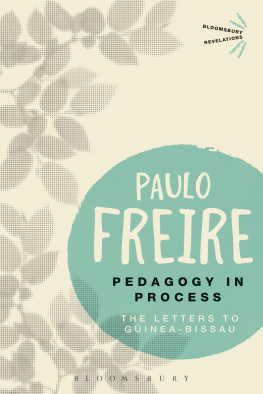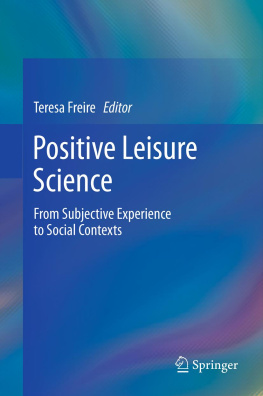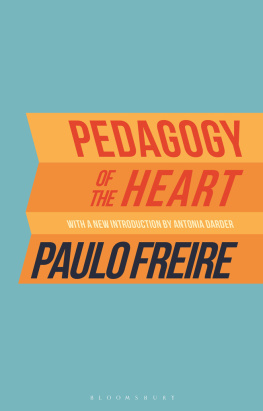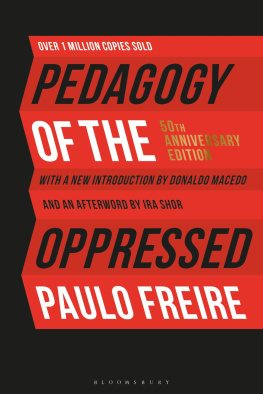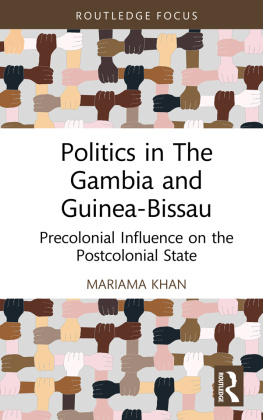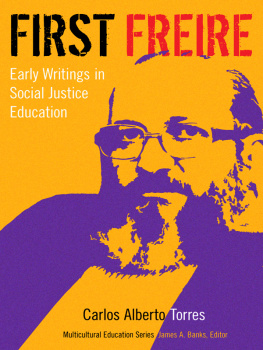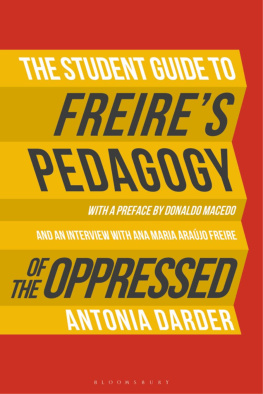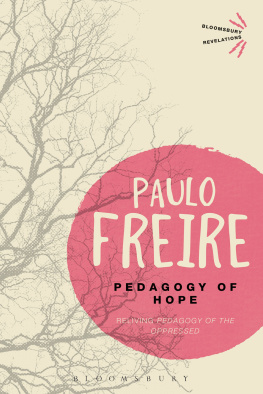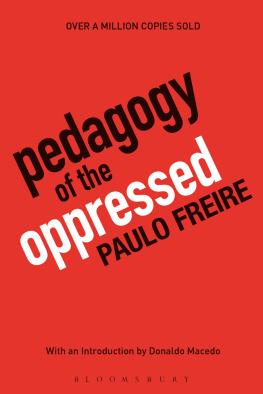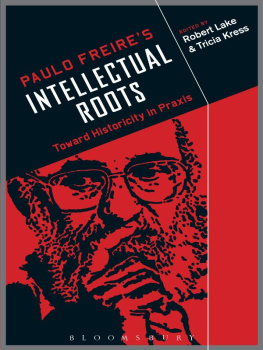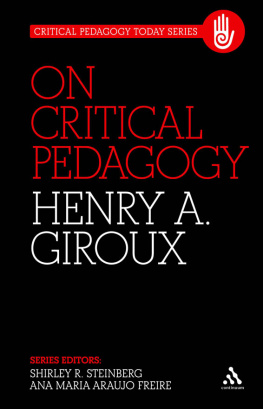Freire - Pedagogy in process: the letters to Guinea-Bissau
Here you can read online Freire - Pedagogy in process: the letters to Guinea-Bissau full text of the book (entire story) in english for free. Download pdf and epub, get meaning, cover and reviews about this ebook. City: London etc, year: 2016, publisher: Bloomsbury UK;Bloomsbury Academic, genre: Politics. Description of the work, (preface) as well as reviews are available. Best literature library LitArk.com created for fans of good reading and offers a wide selection of genres:
Romance novel
Science fiction
Adventure
Detective
Science
History
Home and family
Prose
Art
Politics
Computer
Non-fiction
Religion
Business
Children
Humor
Choose a favorite category and find really read worthwhile books. Enjoy immersion in the world of imagination, feel the emotions of the characters or learn something new for yourself, make an fascinating discovery.
Pedagogy in process: the letters to Guinea-Bissau: summary, description and annotation
We offer to read an annotation, description, summary or preface (depends on what the author of the book "Pedagogy in process: the letters to Guinea-Bissau" wrote himself). If you haven't found the necessary information about the book — write in the comments, we will try to find it.
Freire: author's other books
Who wrote Pedagogy in process: the letters to Guinea-Bissau? Find out the surname, the name of the author of the book and a list of all author's works by series.
Pedagogy in process: the letters to Guinea-Bissau — read online for free the complete book (whole text) full work
Below is the text of the book, divided by pages. System saving the place of the last page read, allows you to conveniently read the book "Pedagogy in process: the letters to Guinea-Bissau" online for free, without having to search again every time where you left off. Put a bookmark, and you can go to the page where you finished reading at any time.
Font size:
Interval:
Bookmark:

Pedagogy in Process
TITLES IN THE BLOOMSBURY REVELATIONS SERIES
The Sexual Politics of Meat , Carol J. Adams
Aesthetic Theory , Theodor W. Adorno
The Oresteia , Aeschylus
Being and Event , Alain Badiou
Infinite Thought , Alain Badiou
Theoretical Writings , Alain Badiou
On Religion , Karl Barth
The Language of Fashion , Roland Barthes
The Intelligence of Evil , Jean Baudrillard
Key Writings , Henri Bergson
I and Thou , Martin Buber
The Tomb of Tutankhamun: Volumes 13 , Howard Carter
A History of the English-Speaking Peoples: Volumes IIV , Sir Winston S. Churchill
Never Give In!, Sir Winston S. Churchill
The Boer War, Sir Winston S. Churchill
The Second World War , Sir Winston S. Churchill
The World Crisis: Volumes IV , Sir Winston S. Churchill
In Defence of Politics , Bernard Crick
Intensive Science and Virtual Philosophy , Manuel DeLanda
Cinema I , Gilles Deleuze
Cinema II , Gilles Deleuze
Difference and Repetition , Gilles Deleuze
Logic of Sense , Gilles Deleuze
A Thousand Plateaus , Gilles Deleuze and Flix Guattari
Anti-Oedipus , Gilles Deleuze and Flix Guattari
Dissemination, Jacques Derrida
Origins of Analytical Philosophy , Michael Dummett
Taking Rights Seriously , Ronald Dworkin
Discourse on Free Will , Desiderius Erasmus and Martin Luther
The Theatre of the Absurd , Martin Esslin
Education for Critical Consciousness , Paulo Freire
Pedagogy of Hope , Paulo Freire
Marxs Concept of Man , Erich Fromm
To Have or To Be? , Erich Fromm
Truth and Method , Hans Georg Gadamer
All Men Are Brothers , Mohandas K. Gandhi
Things Hidden Since the Foundation of the World, Ren Girard
Violence and the Sacred , Ren Girard
Among the Dead Cities , A.C. Grayling
Towards the Light , A.C. Grayling
The Three Ecologies , Flix Guattari
Mindfulness, Martin Heidegger
The Essence of Truth , Martin Heidegger
The Odyssey , Homer
Eclipse of Reason , Max Horkheimer
The Nazi Dictatorship, Ian Kershaw
Language of the Third Reich , Victor Klemperer
Everyday Life in the Modern World, Henri Lefebvre
Rhythmanalysis , Henri Lefebvre
The Modes of Modern Writing , David Lodge
Libidinal Economy , Jean-Franois Lyotard
After Virtue , Alasdair MacIntyre
Time for Revolution , Antonio Negri
Apologia Pro Vita Sua , John Henry Newman
Film Fables, Jacques Rancire
The Politics of Aesthetics , Jacques Rancire
Course in General Linguistics , Ferdinand de Saussure
Understanding Music, Roger Scruton
An Actor Prepares , Constantin Stanislavski
Building A Character , Constantin Stanislavski
Creating A Role , Constantin Stanislavski
States and Markets , Susan Strange
What is Art?, Leo Tolstoy
Interrogating the Real , Slavoj iek
The Universal Exception , Slavoj iek
Some titles are not available in North America.
Pedagogy in Process
The Letters to Guinea-Bissau
Paulo Freire
Translated by Carman St. John Hunter
Bloomsbury Academic
An imprint of Bloomsbury Publishing Plc

Contents
It will come as no surprise to North American readersnot those, at least, who have read the earlier work of Paulo Freireto learn that he has not gone into exile in Geneva in order to escape from history.
On the contrary, as these letters and the introductory essay will quite eloquently attest, Freire is too much a man of praxis to rest very long upon nostalgia for the past, nor even upon the passionate recollection of that past.
It is Fidel Castro who said that the duty of a revolutionary is to make the revolution. If Freires efforts in Brazil and Chile have been arrested, in the short run, by the not-so-subtle operations of the C.I.A., or of those governments imposed upon the people of both nations by domestic rulers who conduct their business in collaboration with the North American and European corporations, Freire himself is unwilling to sit still within an office in Geneva, nor to perform on orders for a liberal audience in San Francisco or New Delhi. Instead, he is industriously at work in building that revolution, made of words that shape the world, in several newborn African nations at this hour.
It would be tempting here to speak again about the basic themesthe generative words and codificationsof Freires pedagogic work among (and with) the desperately poor peasants of Brazil. It would be interesting, also, to attempt to summarize those themes as they are stated once again within the essay that precedes the letters which comprise most of the present book. To do this, however, is to re-run once again the subject-matter of his previous work. It seems far more important, and more human in this case, to speak of these beautiful letters in themselves.
The book, for which these letters provide both core and rationale, will not only broaden the already substantial audience for Freires work. It will also clarify his views, and humanize the man himself, for those who still regard him as an ominous or intimidating person, rather than as the very gentle and, at all times, open and affectionate human being that both his friends and pupils know so well.
Apart from all else, the book provides the best, most idiomatic English version of his writing to this date. More important, it reveals himin the company of Elzain a series of specific situations and direct, emotional relationships with other educators. Thus, not only the translation, but the letter-genre in itself, gives English-speaking readers, at long last, a direct sense of the character of Paulo Freire: a character full of warmth, of humble attitude and militant fervor, all in a single man and oftentimes expressed within a single word or phrase.
It is not surprising that the human side of Paulo Freire has, up to this time, gone largely unperceived. The format of his earlier writings, that of the didactic essay, denies the exposition of those very characteristics which most faithfully reflect the goals and nature of the man. The conversational tone made possible by an exchange of correspondence provides, for the first time, an appropriate literary metaphor for the man who has made dialogue almost a synonym for education.
Freire gives this collection of letters an appropriate title: Pedagogy in Process. It is an ideal title for a book that records, by measured and unhurried stages, the evolution of a pedagogic partnership between Freire (and his colleagues at the World Council of Churches), on the one hand, and the educators of the new-born nation, Guinea-Bissau, on the other. Their common purpose is to develop a literacy program for a newly liberated people.
The correspondence begins as a one-to-one exchange between Freire, writing from Geneva, and Mario Cabral of Guinea-Bissau. Soon, however, the correspondence broadens out to include the other members of the teammembers both in Africa and in Geneva. In spite of the foreshortened time-span of the letters (January, 1975 to spring of 1976), the repercussions of the dialogueas noted in a recent and nostalgic postscriptextend into 1977 and beyond. They also extend beyond one nations borders, leading to collective literacy efforts planned by several of the new nations of Africaall sharing the heritage of many centuries of European domination.
Those who wonder what an exiled educator from Brazil, now resident in Switzerland, might have in common with the people of a land like Guinea-Bissau, will, no doubt, settle first upon the simple fact of a shared heritage of servitude, as stated just above. The deeper bond, however, lies in Freires revolutionary posture, one that is shared by his co-workers and in this case, correspondents, within Guinea-Bissau. The education of an oppressed and struggling people, as he insists at several points, must, from the first, be both political and non-neutralor it never can succeed.
Font size:
Interval:
Bookmark:
Similar books «Pedagogy in process: the letters to Guinea-Bissau»
Look at similar books to Pedagogy in process: the letters to Guinea-Bissau. We have selected literature similar in name and meaning in the hope of providing readers with more options to find new, interesting, not yet read works.
Discussion, reviews of the book Pedagogy in process: the letters to Guinea-Bissau and just readers' own opinions. Leave your comments, write what you think about the work, its meaning or the main characters. Specify what exactly you liked and what you didn't like, and why you think so.

